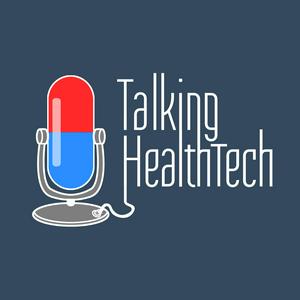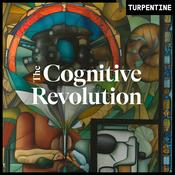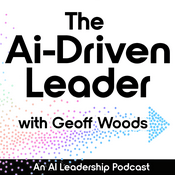611 episodes
586 - Innovating Aged Care and Cancer Treatment: Inside ANDHealth Unfiltered 2025
2026/2/12 | 40 mins.In this episode of Talking HealthTech, host Peter Birch speaks with Carmela Sergi, CEO of the Care Economy CRC, Amanda Caples, Victoria's Chief Scientist, Jeff Malone, CEO of the Aikenhead Centre for Medical Discovery (ACMD), and Trang Nguyen, CEO and Founder of SeeTreat, about the intersection of digital health, innovation, and commercialisation in Australia.
The conversations explore how health technology is designed, implemented, and scaled in real care settings, with a focus on patient outcomes, workforce realities, and practical adoption.
The episode includes in-depth discussion on the future of the care economy and how co-design and end-user involvement are driving more effective, compassionate, and practical solutions.
The discussion also dives into the emerging role of quantum technology in healthcare, strategies for translating research into real-world products, and how cross-sector collaboration can accelerate home-grown innovation.
This episode was recorded during the ANDHealth Unfiltered 2025 event in Melbourne, Australia, and features several discussions that highlight evolving trends and front-line experiences in Australian healthtech.
Key Takeaways
🧑🤝🧑 The Care Economy CRC focuses on integrating technology and data to uplift productivity and outcomes across aged care, disability care, early childhood education, and more, with a major emphasis on co-design and workforce involvement.
🤝 Effective health innovation requires collaboration among government, academia, and industry, with models like ACMD and event conveners like ANDHealth driving partnerships.
📉Technology uptake in healthcare faces barriers including workflow integration, clinician overload, and the risk of unintended consequences, making co-design with end users critical to success.
🦠 Quantum technologies and advanced analytics are emerging as significant contributors to research, service delivery, and patient outcomes, with Victoria positioning itself as an ecosystem leader.
💊 Translation from research to commercialisation is improving in Australia, but ongoing focus on ecosystem navigation, workforce engagement, and industry partnerships remains essential.
Timestamps
00:00 – Introduction
00:28 – Carmela Sergi, CEO, Care Economy CRC
08:34 – Amanda Caples, Victoria’s Chief Scientist
16:34 – Jeff Malone, CEO, ACMD
26:37 –Trang Nguyen, CEO & Founder, SeeTreat
--------
Want to keep the conversation going?
The full article and extended show notes for this episode are available inside the THT+ Community here: View Full Article Here
In the THT+ Community, our members keep the discussion going, share perspectives, and unpack what this episode actually means in practice with others working in healthtech.
If you’re enjoying the show and want access to full articles, episode discussions, meetups, and member-only content, you can learn more about becoming a THT+ Solo Member here: talkinghealthtech.com/thtplus.
And if this episode was useful, leaving a review or sharing it with someone in the industry always helps.
Mentioned in this episode:
This episode is supported by Vanta - the platform trusted by 14,000+ companies to get SOC 2 and ISO audit-ready faster and build enterprise-grade security early. Save $1,000 at https://vanta.com/THT585 - Optimising Patient Flow: Mindset, Metrics, and Continuous Improvement for Hospital Leaders
2026/2/11 | 24 mins.In this episode of Talking HealthTech, Peter Birch speaks with Dr Paul Deffley and Nick White from Alcidion about their new handbook on improving patient flow within healthcare systems.
The conversation explores why the handbook has been released now, its intended audience, and how its concepts can support leaders and clinicians in enhancing the movement of patients through hospitals.
The discussion examines the current pressures facing hospitals, including rising patient demand, workforce challenges, and system inefficiencies, and considers why traditional approaches to patient flow are no longer sufficient.
Lessons from other industries are explored, highlighting how principles such as systems thinking and Lean methodology can be adapted for healthcare.
The episode emphasises the combination of real-time data, organisational culture, and continuous improvement as central to creating safer, more efficient, and patient-centred hospital systems.
Key Takeaways
✅ Patient flow is more than implementing digital solutions—real change requires cultural and behavioural transformation within health organisations
✅ Real-time, system-wide visibility is critical for effective patient flow management and making data-driven decisions
✅ Adopting approaches from other industries, like Lean principles, must be tailored to the unique clinical and operational environment of healthcare
✅ Measuring a broad range of indicators beyond standard KPIs (e.g., length of stay, outliers, medically ready to discharge) provides better insights and guides improvement
✅ Practical actions like shop floor engagement and prioritising system-wide visibility can drive immediate and meaningful change
Timestamps
00:00 – Introduction
00:47 – Who the handbook is for and its purpose
01:33 – Why address patient flow now
02:41 – The importance of system-wide visibility
03:39 – Practical tools from the handbook
05:29 – Comparing healthcare to other industries
07:52 – Customising industry methods for clinical environments
08:57 – Differentiating patient flow discussions from electronic patient records
10:46 – The challenge of demonstrating return on investment in patient flow initiatives
14:30 – Rethinking metrics for measuring success in patient flow
17:27 – Actions health leaders can take today
19:01 – Actionable advice for immediate implementation
20:25 – How to access the handbook
--------
Want to keep the conversation going?
The full article and extended show notes for this episode are available inside the THT+ Community here: View Full Article Here
In the THT+ Community, our members keep the discussion going, share perspectives, and unpack what this episode actually means in practice with other people working in healthtech.
If you’re enjoying the show and want access to full articles, episode discussions, meetups, and member-only content, you can learn more about becoming a THT+ Solo Member here: talkinghealthtech.com/thtplus.
And if this episode was useful, leaving a review or sharing it with someone in the industry always helps.
Mentioned in this episode:
This episode is supported by Vanta - the platform trusted by 14,000+ companies to get SOC 2 and ISO audit-ready faster and build enterprise-grade security early. Save $1,000 at https://vanta.com/THT- In this episode of Talking HealthTech, Peter Birch speaks with Pete Williams, CTO of Tyro Health.
The episode explores the evolution of healthcare payments, including the transition from Medipass to Tyro Health and the latest trends in digital wallets.
It also covers the practicalities of surcharging, regulatory changes, integrated payment solutions, and the potential impact of technologies like stablecoin and PayTo on medical payments for clinics and patients in Australia.
Peter and Pete break down what these changes mean for clinics of all sizes, from day-to-day operations to long-term strategy.
They discuss how seamless payment experiences can improve efficiency, reduce errors, and enhance patient satisfaction, while also highlighting the risks and challenges practices face in a fast-moving digital payments landscape.
The conversation offers practical insights, real-world examples, and a forward-looking view of where healthcare payments are heading.
Key Takeaways
💳 The shift to digital wallets has reshaped payments in healthcare, with over 90% of card-present transactions now happening via Apple Pay, Google Pay, or similar options.
🔁 Surcharging remains a significant consideration for clinics, with around 40% of medical businesses enabling it, though regulations may change.
📲 Integration between payment systems and practice management platforms is now common, driving efficiency with over 70% of clinics automating their payment and reconciliation workflows.
🪙 Emerging payment innovations such as programmable money and advanced bank-to-bank systems like PayTo have the potential to change how recurring and complex healthcare payments are managed.
🏦 Less than 35% of overall healthcare payments are processed through Medicare, making integration with private insurers and funders increasingly critical for clinics.
Timestamps
00:00 – Introduction
00:31 – Changes since Medipass and acquisition by Tyro Health
01:32 – Payment technology experiences in healthcare
02:46 – Growth of the Tyro Health team
03:18 – Clinic perspective on payments
04:36 – Impact of digital wallets
05:39 – Clinic decisions and recent regulatory changes
07:22 – Surcharging rules for debit vs credit cards
08:04 – Balancing payment convenience for patients
08:43 – Percentage impact of payment costs on clinic margins
10:03 – Integrating payments with practice management systems
10:52 – Automation and three-way matching in clinics
12:29 – Approaches to optimising payments
13:53 – Programmable money, stablecoin, and use cases
15:46 – Payment innovation and health system challenges
17:01 – Distributed autonomous organisations
17:21 – PayTo, direct debit, and recurring payments
20:37 – Integrating more funders and improving patient experience
22:29 – Wrap up and resources
--------
Want to keep the conversation going?
The full article and extended show notes for this episode are available inside the THT+ Community here: View Full Article Here
In the THT+ Community, our members keep the discussion going, share perspectives, and unpack what this episode actually means in practice with other people working in healthtech.
If you’re enjoying the show and want access to full articles, episode discussions, meetups, and member-only content, you can learn more about becoming a THT+ Solo Member here: talkinghealthtech.com/thtplus.
And if this episode was... 583 - Navigating Health Technology Assessments: Overcoming Barriers to Patient Access
2026/2/08 | 32 mins.In this episode of Talking HealthTech, Peter Birch speaks with Associate Professor Colman Taylor and Alasdair Godfrey from HTANALYSTS about the evolving landscape of health technology assessment in Australia.
The conversation explores how regulatory change, patient engagement and real-world evidence are reshaping the way new technologies are assessed, funded and adopted.
It also examines the challenges health tech companies face when bringing innovation to market in Australia and across international settings.
They share practical insights into what these changes mean for innovators, clinicians and policy-makers navigating an increasingly complex system.
This episode looks at how value is defined beyond the limits of clinical trials. It also highlights why patient experience and practical implementation are becoming increasingly important in decisions about health technology.
Together, these insights offer a grounded and timely perspective on the forces shaping the future of Australian health technology.
Key Takeaways
🔍 The "valley of death" is a significant hurdle for Australian health tech innovators, where promising technologies struggle to secure funding and market access.
💡 Health Technology Assessment (HTA) frameworks are adapting to consider new dimensions such as equity, patient-centred outcomes, and system impact, beyond traditional cost and clinical effectiveness.
👥 Patient engagement is increasingly recognised as critical, with patients now actively involved in advisory boards and decision-making processes, offering perspectives beyond those of clinicians.
📊 Real-world evidence is helping to fill gaps left by clinical trials, providing insight into system readiness, implementation feasibility, and outcomes for diverse populations.
🌏 International policy changes, particularly from the US and UK, are influencing Australia’s HTA processes and impacting access to innovative therapies for patients.
Timestamps
00:00:00 – Introduction
00:02:05 – Overview of HTANALYSTS and their purpose
00:03:26 – The “valley of death”
00:05:56 – Explaining Health Technology Assessment
00:07:09 – Traditional metrics vs. evolving HTA frameworks
00:08:33 – Government reviews in HTA
00:10:46 – The role of patient engagement and inclusion in HTA
00:12:29 – Application of patient engagement
00:14:10 – Real-world evidence: its role and impact
00:16:27 – Faster access, data barriers, and implementation challenges
00:18:21 – Agility in assessment processes
00:20:09 – Examples of flexibility in healthcare guidelines
00:22:26 – What innovators can do now
00:23:47 – MFN policy changes in the US
00:26:07 – HTANALYSTS’ role as middlemen bridging stakeholders
00:27:15 – Lessons about collaboration, evidence, and early alignment
00:29:06 – Importance of implementation
00:29:55 – Future directions
--------
Want to keep the conversation going?
The full article and extended show notes for this episode are available inside the THT+ Community here: View Full Article Here
In the THT+ Community, our members keep the discussion going, share perspectives, and unpack what this episode actually means in practice with other people working in healthtech.
If you’re enjoying the show and want access to full articles, episode discussions, meetups, and member-only content, you can learn more about becoming a THT+ Solo Member here:582 - North Star vs Shiny Star: Supporting Healthcare Workers and Patient Outcomes with AI
2026/2/04 | 32 mins.In this episode of Talking HealthTech, Peter Birch speaks with Dominique Powis, Chief Technology Officer at Infomedix, Dr John Lambert, Chief Clinical Information Officer for the Department of Health Tasmania, and Dr Jill Freyne, Health Industry Lead at Amazon Web Services.
They discuss the practical applications of artificial intelligence in healthcare and explore its real-world operational impact.
The conversation also includes insights from attendees during a live Q&A session, offering a unique opportunity to hear questions and challenges directly from healthcare professionals and technology leaders.
The panel dives into real-world use cases of AI, including diagnostics, predictive analytics, improving patient outcomes, and boosting administrative efficiency.
They also examine the critical importance of governance, privacy, and practical implementation when integrating AI into everyday clinical workflows.
This episode was recorded live at AWS in Sydney, Australia, and is supported by Infomedix, providing an up-close look at how healthcare AI is being applied in local and global contexts.
Key Takeaways
⭐ Clear problem definition, high-quality data, and context-specific solutions are crucial to successful AI applications in healthcare
🤖 Predictive AI currently offers proven impact in areas such as diagnostics and early detection, while generative AI introduces unique challenges
🧑⚕️ Human-centred design, usability, and workflow integration are critical to successful technology adoption and patient benefit
🔒 Privacy, compliance, and ethical guardrails must evolve with technological advancements, particularly in data handling and patient confidentiality
🌏 Sustainability, change management, and continuous improvement are essential considerations in deploying and scaling AI across the health ecosystem
Timestamps
00:00 – Introduction & event overview
02:00 – Panellist introductions & AI use cases
06:35 – AI pattern recognition benefits
08:39 – Sniff test for viable AI solutions
10:23 – Administrative AI applications
12:45 – Impact opportunities: patient & clinician
14:28 – Administrative vs clinical AI focus
15:35 – Evidence and business cases for ambient scribes
20:06 – Guardrails and governance in AI
22:35 – Change management for AI rollouts
26:30 – Practical advice: North Star vs shiny distractions
32:09 – Audience Q&A: patient privacy, data use
37:39 – Use of AI in culturally diverse aged care settings
44:06 – AI risks, safety, technical guardrails
48:11 – Sustainability and long-term impact
----------
Want to keep the conversation going?
The full article and extended show notes for this episode are available inside the THT+ Community here: View Full Article
In the THT+ Community, our members keep the discussion going, share perspectives, and unpack what this episode actually means in practice with other people working in healthtech.
If you’re enjoying the show and want access to full articles, episode discussions, meetups, and member-only content, you can learn more about becoming a THT+ Solo Member here: talkinghealthtech.com/thtplus.
And if this episode was useful, leaving a review or sharing it with someone in the industry always helps.
Mentioned in this episode:
This episode is supported by Vanta - the platform trusted by 14,000+ companies to get SOC 2 and ISO audit-ready...More Technology podcasts
Trending Technology podcasts
About Talking HealthTech
Conversations with clinicians, vendors, policy makers and decision makers to promote innovation and collaboration for better healthcare enabled by technology. Learn about digital health, medical devices, medtech, biotech, health informatics, life sciences, aged care, disability, commercialisation, startups and so much more.Podcast websiteListen to Talking HealthTech, The Vergecast and many other podcasts from around the world with the radio.net app

Get the free radio.net app
- Stations and podcasts to bookmark
- Stream via Wi-Fi or Bluetooth
- Supports Carplay & Android Auto
- Many other app features
Get the free radio.net app
- Stations and podcasts to bookmark
- Stream via Wi-Fi or Bluetooth
- Supports Carplay & Android Auto
- Many other app features


Talking HealthTech
Scan code,
download the app,
start listening.





































